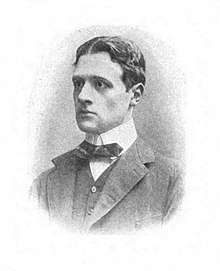Rafael Sabatini
| Rafael Sabatini | |
|---|---|
 |
|
| Born |
29 April 1875 Iesi, Italy |
| Died | 13 February 1950 (aged 74) Adelboden, Switzerland |
| Occupation | Novelist |
| Nationality | Italian / English |
| Genre | romance, adventure |
| Notable works | Scaramouche, Captain Blood |
Rafael Sabatini (29 April 1875 – 13 February 1950) was an Italian/English writer of novels of romance and adventure.
He is best known for his worldwide bestsellers:
In all, Sabatini produced 31 novels, eight short story collections, six non-fiction books, numerous uncollected short stories, and several plays.
Rafael Sabatini was born in Iesi, Italy, to an English mother (Anna Trafford) and Italian father. His parents were opera singers who became teachers.
At a young age, Rafael was exposed to many languages, living with his grandfather in England, attending school in Portugal, and, as a teenager, in Switzerland. By the time he was 17, when he returned to England to live permanently, he had mastered five languages. He quickly added a sixth language – English – to his linguistic collection. He consciously chose to write in his adopted language, because, he said, “all the best stories are written in English".
After a brief stint in the business world, Sabatini went to work as a writer. He wrote short stories in the 1890s, and his first novel came out in 1902. In 1905, he married Ruth Goad Dixon, the daughter of a Liverpool merchant. It took Sabatini roughly a quarter of a century of hard work before he attained success with Scaramouche in 1921. The novel, an historical romance set during the French Revolution, became an international bestseller. It was followed by the equally successful Captain Blood (1922). All of his earlier books were rushed into reprints, the most popular of which was The Sea Hawk (1915). Sabatini was a prolific writer; he produced a new book approximately every year and maintained a great deal of popularity with the reading public through the decades that followed.
Several of his novels were adapted into films during the silent era, and the first three of these books were made into notable films in the sound era, in 1940, 1952, and 1935 respectively. His third novel was made into a famous "lost" film, Bardelys the Magnificent (1926), directed by King Vidor, starring John Gilbert, and long viewable only in a fragment excerpted in Vidor's silent comedy Show People (1928). A few intact reels have recently been discovered in Europe. The fully restored version premièred on TCM on 11 January 2010.
...
Wikipedia
